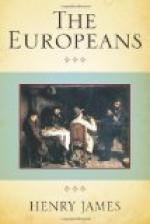“He was in Felix’s studio,” said Madame Munster. “He wanted to see his sketches.”
Clifford looked at Robert Acton, but said nothing; he only fanned himself with his hat. “You chose a bad moment,” said Acton; “you had n’t much light.”
“I had n’t any!” said Clifford, laughing.
“Your candle went out?” Eugenia asked. “You should have come back here and lighted it again.”
Clifford looked at her a moment. “So I have—come back. But I have left the candle!”
Eugenia turned away. “You are very stupid, my poor boy. You had better go home.”
“Well,” said Clifford, “good night!”
“Have n’t you a word to throw to a man when he has safely returned from a dangerous journey?” Acton asked.
“How do you do?” said Clifford. “I thought—I thought you were”—and he paused, looking at the Baroness again.
“You thought I was at Newport, eh? So I was—this morning.”
“Good night, clever child!” said Madame Munster, over her shoulder.
Clifford stared at her—not at all like a clever child; and then, with one of his little facetious growls, took his departure.
“What is the matter with him?” asked Acton, when he was gone. “He seemed rather in a muddle.”
Eugenia, who was near the window, glanced out, listening a moment. “The matter—the matter”—she answered. “But you don’t say such things here.”
“If you mean that he had been drinking a little, you can say that.”
“He does n’t drink any more. I have cured him. And in return—he ’s in love with me.”
It was Acton’s turn to stare. He instantly thought of his sister; but he said nothing about her. He began to laugh. “I don’t wonder at his passion! But I wonder at his forsaking your society for that of your brother’s paint-brushes.”
Eugenia was silent a little. “He had not been in the studio. I invented that at the moment.”
“Invented it? For what purpose?”
“He has an idea of being romantic. He has adopted the habit of coming to see me at midnight—passing only through the orchard and through Felix’s painting-room, which has a door opening that way. It seems to amuse him,” added Eugenia, with a little laugh.
Acton felt more surprise than he confessed to, for this was a new view of Clifford, whose irregularities had hitherto been quite without the romantic element. He tried to laugh again, but he felt rather too serious, and after a moment’s hesitation his seriousness explained itself. “I hope you don’t encourage him,” he said. “He must not be inconstant to poor Lizzie.”
“To your sister?”
“You know they are decidedly intimate,” said Acton.
“Ah,” cried Eugenia, smiling, “has she—has she”—
“I don’t know,” Acton interrupted, “what she has. But I always supposed that Clifford had a desire to make himself agreeable to her.”




